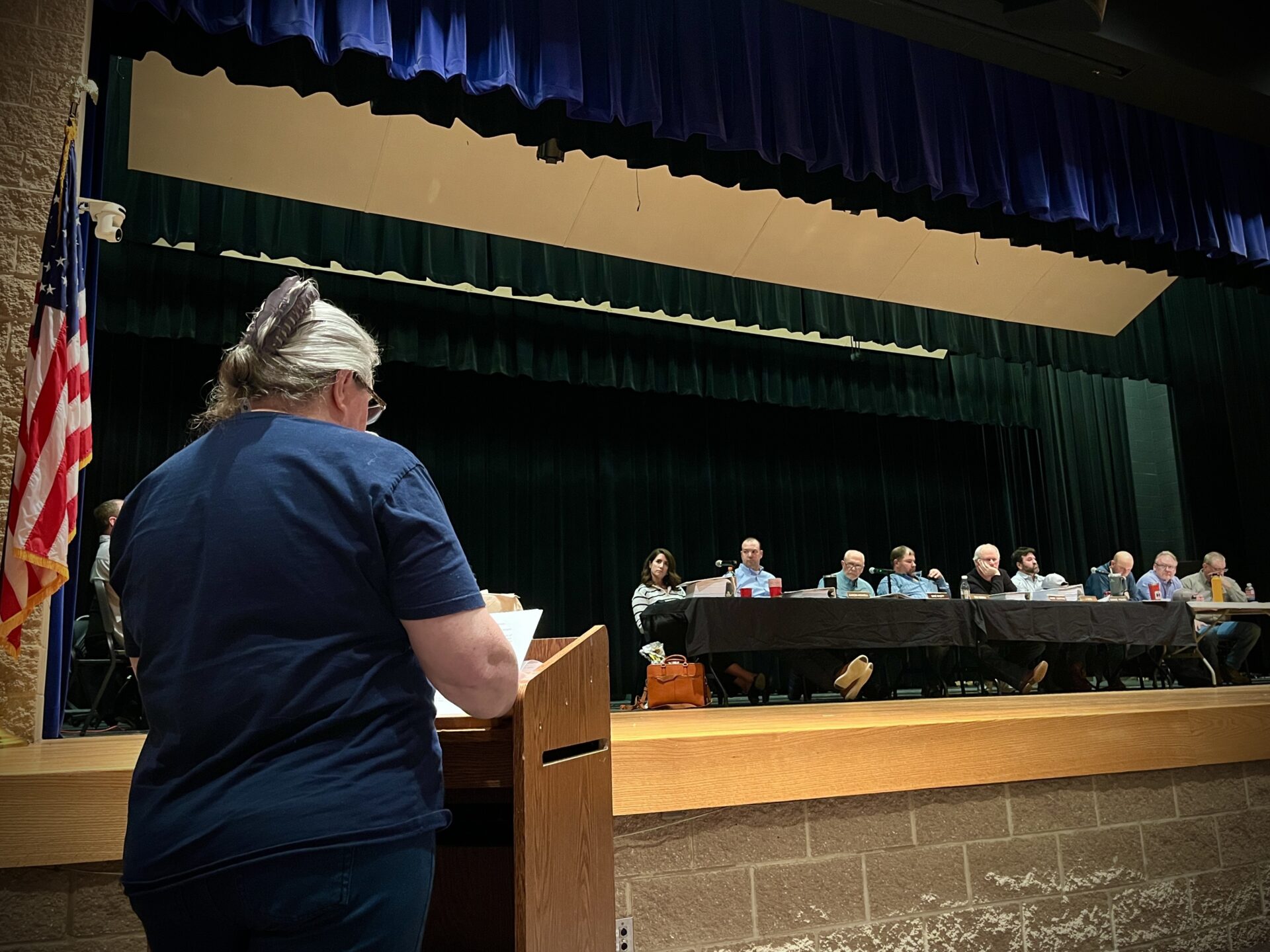The Jefferson County Planning Commission has unanimously rejected a revised concept plan for Mountain Pure Water Bottling Facility, a development proposal that has been mired in public concern since it was first presented to the commission last November.
Sidewinder Enterprises is the single-purpose development company behind Mountain Pure. The planning commission’s decision prevents Sidewinder from moving forward in the permitting process, let alone breaking ground on the project, unless they sue over the terms of rejection.
The company aimed to build a million-square-foot facility to extract and package local groundwater just a short walk from the Middleway Historic District, an eighteenth-century village in rural Jefferson County. But the plan faced a groundswell of pushback from residents concerned about excess water extraction, heavy truck traffic and the facility’s impact on the environment and historic integrity of Middleway.
The planning commission announced their decision more than seven hours into a heated public hearing, which stretched from 7 p.m. Tuesday to nearly 3 a.m. Wednesday. During a public comment period, 125 attendees delivered remarks; 122 of them spoke against the project.
The commission required project representatives to revise their concept plan in November, after unanimously ruling that an initial plan incompletely documented the project’s source water properties. Sidewinder swiftly submitted a revised plan, but its review was pushed back multiple months due to inclement weather and circuit court intervention.
Photo Credit: Jack Walker/West Virginia Public Broadcasting
At the hearing, Sean Masterson, a management partner for Sidewinder, and Mark Dyck, vice president for planning firm Integrity Federal Services, walked the commission through their revised plan.
Masterson described some comments from residents as “a character attack on us as a business,” and said the project would be a boon to the local job market.
Dyck said the revised concept plan accurately documented all parcels of land associated with the project. In response to resident concerns, he also said project reps planned roadway safety modifications like a traffic circle, and water use stopgaps to prevent overextraction.
“That’s a pretty good guarantee,” Dyck said regarding the water limits.
Dyck also said the revised plan included a mechanism to detect the spread of toxic chemicals from the project site. A 2018 geological survey found that a plume of two toxic chemicals, trichloroethane and dichloroethene, exists in the groundwater beneath the proposed Mountain Pure site from past industrial activity.
The property was previously used by Kodak, a photography company, and 3M, a multinational conglomerate that has had to pay billions of dollars to settle lawsuits for contaminating waterways with “forever chemicals.” Farmers and environmentalists in the Middleway area have expressed particular concern that renewed water use at the site could produce chemical runoff, a claim which project representatives dispute.
Photo Credit: Jack Walker/West Virginia Public Broadcasting
Members of the planning commission said they shared several resident concerns. Commission President Mike Shepp said he still worried the project would be overly burdensome on local traffic, adding that he would prefer to see an additional water study conducted before development.
Ultimately, members of the commission voted to reject the Mountain Pure concept plan on the basis that it did not comply with county policies.
Commissioner Cara Keys — who also represents Shepherdstown on the Jefferson County Commission — motioned to “reject the concept plan as presented, as it directly conflicts with our zoning ordinance.”
As part of her reasoning, Keys specifically cited Section 4.4-C of the Jefferson County Zoning and Land Development Ordinance, which states: “Any development which would destroy the historical character of a property listed on the West Virginia or National Register of Historic Places shall not be permitted.”
The Mountain Pure project would have installed a pipeline beneath the village to transport water, and would have required trucks to travel through Middleway’s streets to reach the site. Members of the commission unanimously agreed with the commissioner’s motion.
“We just made a motion to reject the concept plan for the bottling project in Middleway,” Keys told West Virginia Public Broadcasting shortly after the hearing. “We found, as a planning commission, that it did not coincide with our zoning ordinance and our subdivision regulations, so we rejected it unanimously.”
Dyck declined to comment on the Mountain Pure team’s behalf after the hearing.
Photo Credit: Jack Walker/West Virginia Public Broadcasting
Hundreds of residents of West Virginia’s Eastern Panhandle attended the hours-long hearing. While some left over the course of the night, dozens stayed until the end, including Stacy Chapman.
Chapman is a nurse, Middleway resident and lead organizer for Protect Middleway, a grassroots group that formed in opposition to the project. For months, Chapman and her team have hosted town halls, spoke out on social media and even knocked on neighbors’ doors to rally residents against the bottling facility proposal.
Chapman described the hearing as a culmination of months of hard work, and told WVPB she was “overjoyed” by its result. While she said the Mountain Pure team pursuing legal action would be unsurprising, Chapman said she views the commission’s decision as a win.
“It’s hard not to cry, because it was not just important to me. It was important to the community,” Chapman said just after the hearing. “It was important to the people who stewarded Middleway for the last 300 years.”
“We were determined that we were going to carefully steward Middleway just like they did,” she added. “And we did it tonight.”
